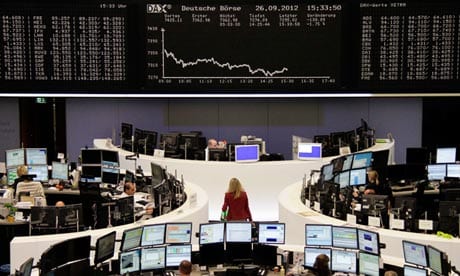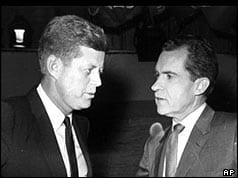Chronicles of Inequality [TOO MUCH, 20 May 2013)
 |
May 20, 2013 |
| THIS WEEK | |
| Oh, please, spare us any more pious declarations. After a week of “IRS scandal,” we simply can’t bear another bogus claim that we’re witnessing one of the “most shameful abuses of government power in 20th-century American history.”We’re witnessing no such thing. Let’s be clear about what’s really happened: An understaffed and overburdened IRS office responsible for handling applications for a tax-exempt status that lets political groups conceal their donors cut corners.This office took the “path of least resistance.” Staffers crudely targeted a “rickety raft of minor Tea Party groups” and ignored the “heavily lawyered-up big-money groups” that had already gained this special tax-exempt status. These billionaire-subsidized outfits would go on to pump over $250 million into the 2012 elections.The real scandal here? Our super rich, as campaign finance reformer Arn Pearson puts it, are continuing “to influence the outcome of elections while keeping their identities secret.” The real core problem here? The continuing concentration of America’s wealth in a precious few hands. More on that concentration — and its toxic impact — in this week’s Too Much. | About Too Much, a project of the Institute for Policy StudiesProgram on Inequality and the Common GoodSubscribe to Too MuchJoin us on Facebook or follow us on Twitter |
| GREED AT A GLANCE | |
America’s fasting-growing income gap? That may well sit at America’s economic summit. Retail analysts spent last week bemoaning how Americans making just over $250,000 are now “thinking twice” before splurging. These affluents,complains luxury marketer Pam Danzinger, “have lost their exuberance.” Even worse, they’re behaving no better than Henrys — or “High Earner Not Rich Yet,” the marketing label for households in the $100,000-$250,000 annual income range — and buying Coach over Prada. But households worth over $5 million, luxury gurus say, aren’t slowing down at all. “Ultra-luxury” goods are actually booming. One sign of the times: a fierce demand for high-end hotel rooms. Paris alone now has four hotels where suites go for over $25,000 a night . . . The newly elected Pope Francis, the leader of the world’s 1.2 billion Catholics, last week delivered what the Vatican calledhis “first forceful speech on the economic and financial crisis.” His target: those ideologies that “uphold the absolute autonomy of markets and financial speculation” at the expense of the “common good.” This ideological mindset, the Pope told an assembly of diplomats, has led to corruption and tax evasion that have left the incomes of a minority “increasing exponentially” while incomes of the majority “are crumbling.” The resulting inequality, the Pope added, is extinguishing the “joy of life.” The “golden calf of old,” he continued, has found a new “heartless image in the cult of money” and an economy “lacking any truly human goal.”Some of us think June and see weddings. Deep-pockets, suggests a new Spectrem Group survey of wealthy Americans, think June and sign “pre-nups,” the legal papers that determine who gets what assets when a married twosome drifts apart and calls it quits. Over two-thirds of Americans worth over $5 million, Spectrem found, advise friends and family about to tie the knot to sign a pre-nup first. But many of these wealthy do that advising with some misgivings. Over half the affluents studied, 54 percent, feel that pre-nups “introduce a negative feeling toward marriage,” and nearly a third believe pre-nups “wrongly place an emphasis on money.” On the other hand, 34 percent see “no disadvantages” to pre-nups whatsoever, and 72 percent feel pre-nups definitely do “protect assets.” The newly elected Pope Francis, the leader of the world’s 1.2 billion Catholics, last week delivered what the Vatican calledhis “first forceful speech on the economic and financial crisis.” His target: those ideologies that “uphold the absolute autonomy of markets and financial speculation” at the expense of the “common good.” This ideological mindset, the Pope told an assembly of diplomats, has led to corruption and tax evasion that have left the incomes of a minority “increasing exponentially” while incomes of the majority “are crumbling.” The resulting inequality, the Pope added, is extinguishing the “joy of life.” The “golden calf of old,” he continued, has found a new “heartless image in the cult of money” and an economy “lacking any truly human goal.”Some of us think June and see weddings. Deep-pockets, suggests a new Spectrem Group survey of wealthy Americans, think June and sign “pre-nups,” the legal papers that determine who gets what assets when a married twosome drifts apart and calls it quits. Over two-thirds of Americans worth over $5 million, Spectrem found, advise friends and family about to tie the knot to sign a pre-nup first. But many of these wealthy do that advising with some misgivings. Over half the affluents studied, 54 percent, feel that pre-nups “introduce a negative feeling toward marriage,” and nearly a third believe pre-nups “wrongly place an emphasis on money.” On the other hand, 34 percent see “no disadvantages” to pre-nups whatsoever, and 72 percent feel pre-nups definitely do “protect assets.” |
Quote of the Week“Billionaires with an axe to grind, now is your time. Not since the days before a bumbling crew of would-be break-in artists set into motion the fabled Watergate scandal, leading to the first far-reaching restrictions on money in American politics, have you been so free to meddle.” Andy Kroll, Billionaires Unchained, TomDispatch, May 16, 2013 |
| PETULANT PLUTOCRAT OF THE WEEK | |
 Apple CEO Tim Cook will be testifying this week before a U.S. Senate panel probing corporate tax avoidance. Cook makes for an obvious witness. Apple is now parking $102.3 billion in cash overseas, deftly using tax havens to sidestep billions in state and federal corporate taxes. Last week, in advance of his Senate appearance, Cook made the media rounds for a pre-emptive strike against his accusers. Crowed Cook: “Apple has a very strong moral compass.” In fact, the unapologetic CEO added, “Apple is paying approximately $1 million an hour in just domestic income taxes.” That sounds fairly impressive — until you realize that Tim Cook alone, in his first year as Apple’s CEO, grabbed a personal pay package worth $378 million, more than $1 million per day. Apple CEO Tim Cook will be testifying this week before a U.S. Senate panel probing corporate tax avoidance. Cook makes for an obvious witness. Apple is now parking $102.3 billion in cash overseas, deftly using tax havens to sidestep billions in state and federal corporate taxes. Last week, in advance of his Senate appearance, Cook made the media rounds for a pre-emptive strike against his accusers. Crowed Cook: “Apple has a very strong moral compass.” In fact, the unapologetic CEO added, “Apple is paying approximately $1 million an hour in just domestic income taxes.” That sounds fairly impressive — until you realize that Tim Cook alone, in his first year as Apple’s CEO, grabbed a personal pay package worth $378 million, more than $1 million per day. |
Like Too Much? Email this issue to a friend |
| IMAGES OF INEQUALITY | |
| Web GemWal-Mart Subsidy Watch/ How the world’s biggest retailer is using taxpayer dollars, state by state and town by town, to grow billionaire fortunes. | |
| PROGRESS AND PROMISE | |
| In India, Wealth Comes under Tax ScrutinyIn India today, the ultra rich are gobbling up the penthouses that crown the residential towers now popping up in cities like Mumbai. These duplexes and triplexes can run up to $9 million each and exquisitely separate their wealthy owners from street-level poverty and pollution. As realtor Shri Hari put it earlier this month: “Nobody can touch you there.” Well, maybe somebody can touch you. Indian tax authorities have just launched a new offensive against rampant tax evasion. They’re requiring Indian affluents to report on their income tax returns all their financial, real estate, and “moveable” assets — vehicles, yachts, private jets, gold bullion, jewelry, and works of art. The new mandate aims to identify Indians with assets “disproportionate to their known sources of income.” | Take Action on InequalityWill the 99 percent outbid the billionaires trying to buy the newspaper chain that includes the Los Angeles Times? Watch the video, join the bid. |
| INEQUALITY BY THE NUMBERS | |
 |
Stat of the WeekBack in 1996, the developed world’s top 10 percent took home 8.9 times the income of the bottom 10 percent. That gap in 2010: 9.8 times. Over those same years, the Organization for Economic Cooperation and Developmentreports, the U.S. gap between top and bottom 10 percent rose from 12.5 to 15.9 times.
|
| IN FOCUS | |
Satisfaction and Smiles in an Unequal WorldIf President Obama played basketball with the king of Bhutan, would the world have a better shot at becoming a happier place?What makes us happy? A simple question. In America, we’ve been asking it ever since 1776, the year we declared for “life, liberty, and the pursuit of happiness.”Back in those days, Americans hoping to encourage happiness had little more than guesswork to go by. Today we have help: a new science of happiness, with years of research findings.John de Graaf, the executive director of the Seattle-based Take Back Your Timeand the co-author of What’s the Economy For, Anyway? has done as much as any American to share what this science has to offer. Too Much caught up with de Graaf last week for an exchange on the factors that make for happiness — and how inequality impacts them. Our conventional global economic wisdom, of course, ignores any possible relationship between happiness and inequality. To make us happier, this standard wisdom assumes, we just need to grow economically. Higher GDPs will bring us higher levels of “life satisfaction” and “subjective well-being.” Our conventional global economic wisdom, of course, ignores any possible relationship between happiness and inequality. To make us happier, this standard wisdom assumes, we just need to grow economically. Higher GDPs will bring us higher levels of “life satisfaction” and “subjective well-being.”
In fact, as de Graaf points out, beyond a certain level of Gross Domestic Product — about the current GDP of Portugal — we have no research evidence that countries become happier as they become richer. “We do have evidence that other factors — reduced stress and greater leisure time, good health and social connections — do contribute to greater happiness,” he adds. “And so does the opportunity to do meaningful work and live in a democratic society that fosters trust and personal safety, with access to education, arts, culture, and nature.” Which societies in the world today rank highest on factors like these? The world’s most equal nations. These societies discourage the flaunting of wealth and encourage social connectivity. People in them have among the shortest working hours and the best “work-life” balance in the world. “In the United States,” says de Graaf, “we have about the worst work-life balance among rich countries.” In our society, nothing signals status and success more than personal wealth, and people labor ever longer hours to grab as much of it as they can. But this chase after fortune undercuts our ability to take the satisfaction that comes from leisure time and all the other quality-of-life dimensions so critical to happiness. “When we gain personal wealth at the expense of these dimensions, our personal well-being suffers,” observes de Graaf. “When a whole society pursues personal wealth for the few at the expense of these dimensions for the many, that entire society suffers. That’s what we see in America today.” We see a good bit more as well. “Our ever-greater piling on of personal wealth,” de Graaf notes, “is threatening to leave future generations a barren planet.” Americans are already exhausting the world’s resources and waste sinks more rapidly than they can naturally replenish. If everyone on earth lived the American consumer lifestyle, as the Global Footprint Network details, humanity would need five planets to provide the resources and absorb the wastes. “We simply cannot grow on like this,” says de Graaf. “We need to find a different approach to well-being for the sake of the future.” This sort of talk, he acknowledges, scares those Americans who believe that we have no alternative to the status quo if we want “the economy” to thrive. “These Americans accept the notion that we’re here to serve the economy,” says de Graaf. “But the economy should be serving us.” In Bhutan, the tiny Himalayan nation de Graaf recently visited as part of an international advisory group, policy makers have been working to re-orient their economy in this direction. Bhutan has become the first society on earth to make the pursuit of happiness its prime driver of public policy. Over recent years, de Graaf relates, life expectancy, literacy, and happiness levels have all “increased spectacularly” in Bhutan. The nation ensures all workers a month of annual vacation. Small touches matter for happiness, too. In winter, workdays run from 9 to 4, to keep workers from having to travel to and from work in darkness. The Bhutanese are now asking the United Nations to explore new progress markers — linked to sustainable well-being and happiness — that can replacetraditional GDP measures, and next year, in June, the young king of Bhutan will be traveling to the UN and the United States to help make that case. Like this article? Sign up Will anybody be listening? De Graaf certainly hopes so — and thinks a little basketball game might help. Turns out that Bhutan’s 33-year-old king plays a mean game of hoops, among the best in his country. A game on the White House court with the king and President Obama, says de Graaf, just might attract some global media attention. “Add a few celebrities and NBA stars to the game,” he dreams, “and you could have an international event of great import, an event that could get people talking about measuring ‘equitable and sustainable well-being’ instead of GDP.” And that would be something to truly get happy about. More from the Too Much interview with John de Graaf at Inequality.Org. |
New Wisdom on WealthHarold Meyerson, The Upside Down Economy,American Prospect, May 13, 2013. Two-thirds of the rise in corporate profits between the end of the dot-com bust and the collapse of 2008 came directly from the lower wages corporate execs paid their workers.Nathan Tankus, The Transit Coup: How Robber Barons got New York City to Bail Out Their Subway Lines,Naked Capitalism, May 16, 2013. A look back at classic plutocratic extortion.Paul Solman, Inequality Today: Worse than a Century Ago? The Business Desk, May 17, 2013. In the United States, yes, says this PBS correspondent.Sheila Krumholz and Danielle Brian, How Money Rules Washington, Moyers & Company, May 17, 2013. A talk with two veteran public interest watchdogs. Steven Harper, Ugliness Inside the Am Law 100,The Am Law Daily, May 17, 2013. Growing income gaps within big-time law firms are poisoning partnership. Salvatore Babones, OECD: Inequality Rising Faster than Ever, Inequality.Org, May 19, 2013. An analysis of the latest developed world income data.
Get a sense of the new bookby Too Much editor Sam Pizzigati. Read theintroductory chapter. |
| NEW AND NOTABLE | |
Where the Global Ultra Rich Most Enjoy Living World City Millionaire Rankings, WealthInsight, London, May 2013.Which city in the world today hosts the most rich people? That depends on how you define rich, as this new research into global wealth data details quite nicely.No city anywhere holds more millionaires, as measured in U.S. dollars, than Tokyo. Japan’s largest urban center sported 461,000 millionaires as of this past December. In second place, New York, with 389,000.Move up a notch, and the story changes. London has more households worth at least $30 million than any other urban center. The London total: 4,224. World City Millionaire Rankings, WealthInsight, London, May 2013.Which city in the world today hosts the most rich people? That depends on how you define rich, as this new research into global wealth data details quite nicely.No city anywhere holds more millionaires, as measured in U.S. dollars, than Tokyo. Japan’s largest urban center sported 461,000 millionaires as of this past December. In second place, New York, with 389,000.Move up a notch, and the story changes. London has more households worth at least $30 million than any other urban center. The London total: 4,224.
On billionaires, a different story still. New York — we’re actually only talking Manhattan here — leads the way with 70, with Moscow close behind at 64. These city figures give the impression that the world has a variety of geographic high-wealth centers. But the figures by country — also conveniently provided in this new WealthInsight report — show that one nation clearly stands far above all the rest as a homeland for substantial fortune: the United States. Some 5.23 million millionaires live stateside, a total that just about matches the millionaire population of the next four countries on the WealthInsight millionaire list — Japan, Germany, China, and the UK — all combined. |
Like Too Much? |
| ABOUT TOO MUCH | |
| Too Much, an online weekly publication of the Institute for Policy Studies | 1112 16th Street NW, Suite 600, Washington, DC 20036 | (202) 234-9382 | Editor: Sam Pizzigati. | E-mail: editor@toomuchonline.org | Unsubscribe. | Subscribe to Too Much |





